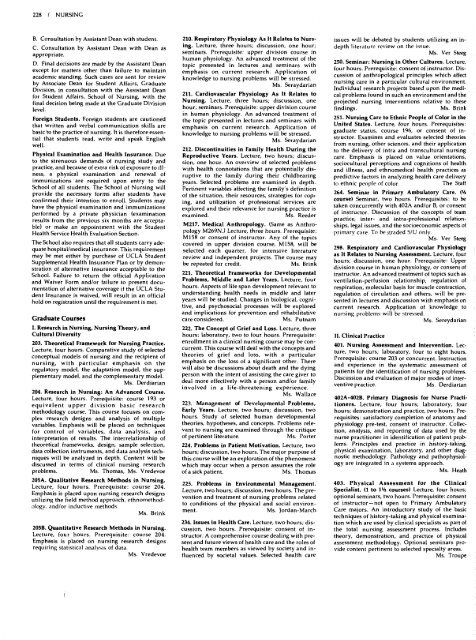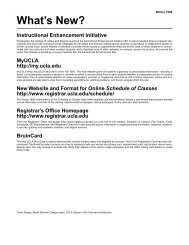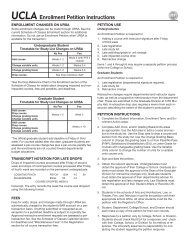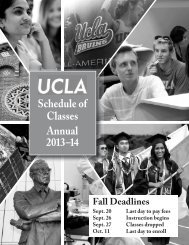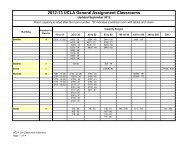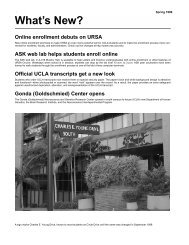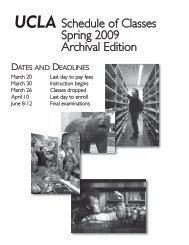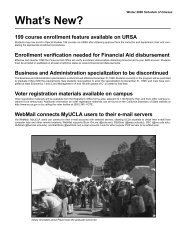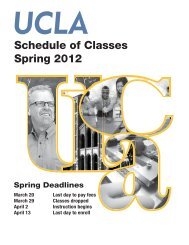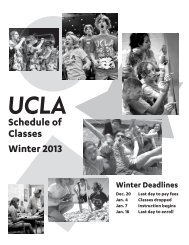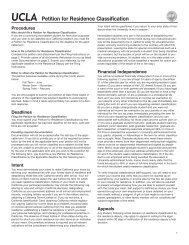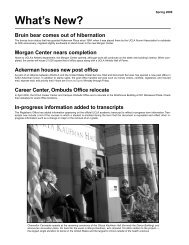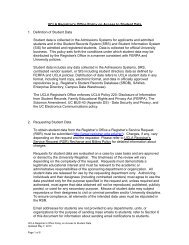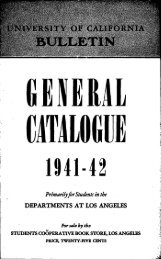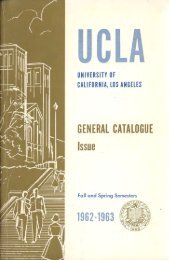UCLA Graduate Catalog 1980-81 - Registrar - UCLA
UCLA Graduate Catalog 1980-81 - Registrar - UCLA
UCLA Graduate Catalog 1980-81 - Registrar - UCLA
You also want an ePaper? Increase the reach of your titles
YUMPU automatically turns print PDFs into web optimized ePapers that Google loves.
228 / NURSING<br />
B. Consultation by Assistant Dean with student.<br />
C. Consultation by Assistant Dean with Dean as<br />
appropriate.<br />
D. Final decisions are made by the Assistant Dean<br />
except for matters other than failure to maintain<br />
academic standing. Such cases are sent for review<br />
by Associate Dean for Student Affairs, <strong>Graduate</strong><br />
Division, in consultation with the Assistant Dean<br />
for Student Affairs, School of Nursing, with the<br />
final decision being made at the <strong>Graduate</strong> Division<br />
level.<br />
Foreign Students. Foreign students are cautioned<br />
that written and verbal communication skills are<br />
basic to the practice of nursing. It is therefore essential<br />
well.<br />
that students read, write and speak English<br />
Physical Examination and Health Insurance. Due<br />
to the strenuous demands of nursing study and<br />
practice, and because of extra risk of exposure to illness,<br />
a physical examination and renewal of<br />
immunizations are required upon entry to the<br />
School of all students. The School of Nursing will<br />
provide the necessary forms after students have<br />
confirmed their intention to enroll. Students may<br />
have the physical examination and immunizations<br />
performed by a private physician (examination<br />
results from the previous six months are acceptable)<br />
or make an appointment with the Student<br />
Health Service Health Evaluation Section.<br />
The School also requires that all students carry adequate<br />
hospital/medical insurance. This requirement<br />
may be met either by purchase of <strong>UCLA</strong> Student<br />
Supplemental Health Insurance Plan or by demonstration<br />
of alternative insurance acceptable to the<br />
School. Failure to return the official Application<br />
and Waiver Form and/or failure to present documentation<br />
of alternative coverage if the <strong>UCLA</strong> Student<br />
Insurance is waived, will result in an official<br />
hold on registration until the requirement is met.<br />
<strong>Graduate</strong> Courses<br />
1. Research in Nursing , Nursing Theory, and<br />
Cultural Diversity<br />
203. Theoretical Framework for Nursing Practice.<br />
Lecture, four hours. Comparative study of selected<br />
conceptual models of nursing and the recipient of<br />
nursing, with particular emphasis on the<br />
regulatory model, the adaptation model, the supplementary<br />
model, and the complementary model.<br />
Ms. Derdiarian<br />
204. Research in Nursing : An Advanced Course.<br />
Lecture, four hours. Prerequisite: course 193 or<br />
equivalent upper division basic research<br />
methodology course. This course focuses on complex<br />
research designs and analysis of multiple<br />
variables. Emphasis will be placed on techniques<br />
for control of variables, data analysis, and<br />
interpretation of results. The interrelationship of<br />
theoretical frameworks, design, sample selection,<br />
data collection instruments, and data analysis techniques<br />
will be analyzed in depth. Content will be<br />
discussed in terms of clinical nursing research<br />
problems. Ms. Thomas, Ms. Vredevoe<br />
205A. Qualitative Research Methods in Nursing.<br />
Lecture, four hours. Prerequisite: course 204.<br />
Emphasis is placed upon nursing research designs<br />
utilizing the field method approach, ethnomethodologv,<br />
and/or inductive methods.<br />
Ms. Brink<br />
205B. Quantitative Research Methods in Nursing.<br />
Lecture, four hours. Prerequisite: course 204.<br />
Emphasis is placed on nursing research designs<br />
requiring statistical analysis of data.<br />
Ms. Vredevoe<br />
210. Respiratory Physiology As It Relates to Nursing.<br />
Lecture, three hours; discussion, one hour;<br />
seminars. Prerequisite: upper division course in<br />
human physiology. An advanced treatment of the<br />
topic presented in lectures and seminars with<br />
emphasis on current research. Application of<br />
knowledge to nursing problems will be stressed,<br />
Ms. Seraydarian<br />
211. Cardiovascular Physiology As It Relates to<br />
Nursing . Lecture, three hours; discussion, one<br />
hour; seminars. Prerequisite: upper division course<br />
in human physiology. An advanced treatment of<br />
the topic presented in lectures and seminars with<br />
emphasis on current research. Application of<br />
knowledge to nursing problems will be stressed.<br />
Ms. Seraydarian<br />
212. Discontinuities in Family Health During the<br />
Reproductive Years. Lecture, two hours; discussion,<br />
one hour. An overview of selected problems<br />
with health connotations that are potentially disruptive<br />
to the family during their childbearing<br />
years. Selected problems are examined in depth.<br />
Pertinent variables affecting the family's definition<br />
of the situation, their resources, strategies for copy<br />
ing, and utilization of professional services are<br />
explored and their relevance for nursing practice is<br />
examined. Ms. Reeder<br />
M217. Medical Anthropology . (Same as Anthropology<br />
M269N.) Lecture, three hours. Prerequisite:<br />
M158 or consent of instructor. Any of the topics<br />
covered in upper division course, M158, will be<br />
selected each quarter, for intensive literature<br />
review and independent projects. The course may<br />
be repeated for credit. Ms. Brink<br />
221. Theoretical Frameworks for Developmental<br />
Problems , Middle and Later Years. Lecture, four<br />
hours. Aspects of life span development relevant to<br />
understanding health needs in middle and later<br />
years will be studied. Changes in biological, cognitive,<br />
and psychosocial processes will be explored<br />
and implications for prevention and rehabilitative<br />
care considered. Ms. Putnam<br />
222. The Concept of Grief and Loss. Lecture, three<br />
hours; laboratory, two to four hours. Prerequisite:<br />
enrollment in a clinical nursing course may be concurrent.<br />
This course will deal with the concepts and<br />
theories of grief and loss, with a particular<br />
emphasis on the loss of a significant other. There<br />
will also be discussions about death and the dying<br />
person with the intent of assisting the care giver to<br />
deal more effectively with a person and/or family<br />
involved in a life-threatening experience.<br />
Ms. Wallace<br />
223. Management of Developmental Problems,<br />
Early Years . Lecture, two hours; discussion, two<br />
hours. Study of selected human developmental<br />
theories, hypotheses, and concepts. Problems relevant<br />
to nursing are examined through the critique<br />
of pertinent literature. Ms. Porter<br />
224. Problems in Patient Motivation . Lecture, two<br />
hours; discussion, two hours. The major purpose of<br />
this course will be an exploration of the phenomena<br />
which may occur when a person assumes the role<br />
of a sick patient. Ms. Thomas<br />
225. Problems in Environmental Management.<br />
Lecture, two hours; discussion, two hours. The prevention<br />
and treatment of nursing problems related<br />
to conditions of the physical and social environment.<br />
Ms. Jordan-March<br />
234. Issues in Health Care. Lecture, two hours; discussion,<br />
two hours. Prerequisite: consent of instructor.<br />
A comprehensive course dealing with present<br />
and future views of health care and the roles of<br />
health team members as viewed by society and influenced<br />
by societal values. Selected health care<br />
issues will be debated by students utilizing an indepth<br />
literature review on the issue.<br />
Ms. Ver Steeg<br />
250. Seminar : Nursing in Other Cultures . Lecture,<br />
four hours. Prerequisite: consent of instructor. Discussion<br />
of anthropological principles which affect<br />
nursing care in a particular cultural environment.<br />
Individual research projects based upon the medical<br />
problems found in such an environment and the<br />
projected nursing interventions relative to these<br />
findings. Ms. Brink<br />
251. Nursing Care to Ethnic People of Color in the<br />
United States . Lecture, four hours. Prerequisites:<br />
graduate status, course 196, or consent of instructor.<br />
Examines and evaluates selected theories<br />
from nursing, other sciences, and their application<br />
to the delivery of intra and transcultural nursing<br />
care. Emphasis is placed on value orientations,<br />
sociocultural perceptions and cognitions of health<br />
and illness, and ethnomedical health practices as<br />
predictive factors in analyzing health care delivery<br />
to ethnic people of color. The Staff<br />
264. Seminar in Primary Ambulatory Care. (f<br />
course ) Seminar, two hours. Prerequisites: to be<br />
taken concurrently with 402A and/or B, or consent<br />
of instructor. Discussion of the concepts of team<br />
practice, inter- and intra-professional relationships,<br />
legal issues, and the socioeconomic aspects of<br />
primary care. To be graded S/U only.<br />
Ms. Ver Steeg<br />
298. Respiratory and Cardiovascular Physiology<br />
as It Relates to Nursing Assessment . Lecture, four<br />
hours; discussion, one hour. Prerequisite: Upper<br />
division course in human physiology, or consent of<br />
instructor. An advanced treatment of topics such as<br />
ventilation-perfusion relationship, regulation of<br />
respiration, molecular basis for muscle contraction,<br />
regulation of circulation and others, will be presented<br />
in lectures and discussion with emphasis on<br />
current research. Application of knowledge to<br />
nursing problems will be stressed.<br />
Ms. Sereydarian<br />
11. Clinical Practice<br />
401. Nursing Assessment and Intervention. Lecture,<br />
two hours; laboratory, four to eight hours.<br />
Prerequisite: course 203 or concurrent. Instruction<br />
and experience in the systematic assessment of<br />
patients for the identification of nursing problems.<br />
Discussion and evaluation of major modes of interventive<br />
practice. Ms. Derdiarian<br />
402A-402B . Primary Diagnosis for Nurse Practitioners.<br />
Lecture, four hours; laboratory, four<br />
hours; demonstration and practice, two hours. Prerequisites:<br />
satisfactory completion of anatomy and<br />
physiology pre-test, consent of instructor. Collection,<br />
analysis, and reporting of data used by the<br />
nurse practitioner in identification of patient problems.<br />
Principles and practice in history-taking,<br />
physical examination, laboratory, and other diagnostic<br />
methodology. Pathology and pathophysiology<br />
are integrated in a systems approach.<br />
Ms. Heath<br />
403. Physical Assessment for the Clinical<br />
Specialist. (1 to 1% courses) Lecture, four hours;<br />
optional seminars, two hours. Prerequisite: consent<br />
of instructor-not open to Primary Ambulatory<br />
Care majors. An introductory study of the basic<br />
techniques of history-taking and physical examination<br />
which are used by clinical specialists as part of<br />
the total nursing assessment process. Includes<br />
theory, demonstration, and practice of physical<br />
assessment methodology. Optional seminars provide<br />
content pertinent to selected specialty areas.<br />
Ms. Troupe


